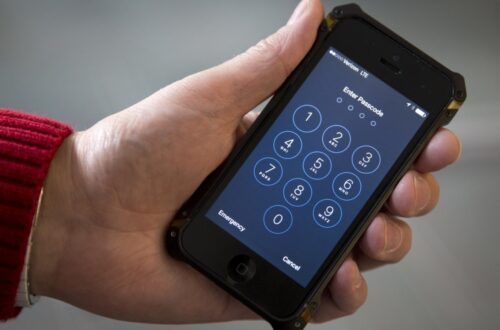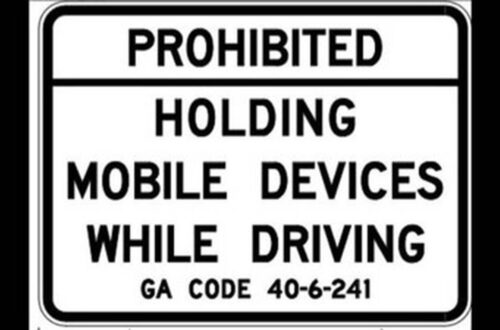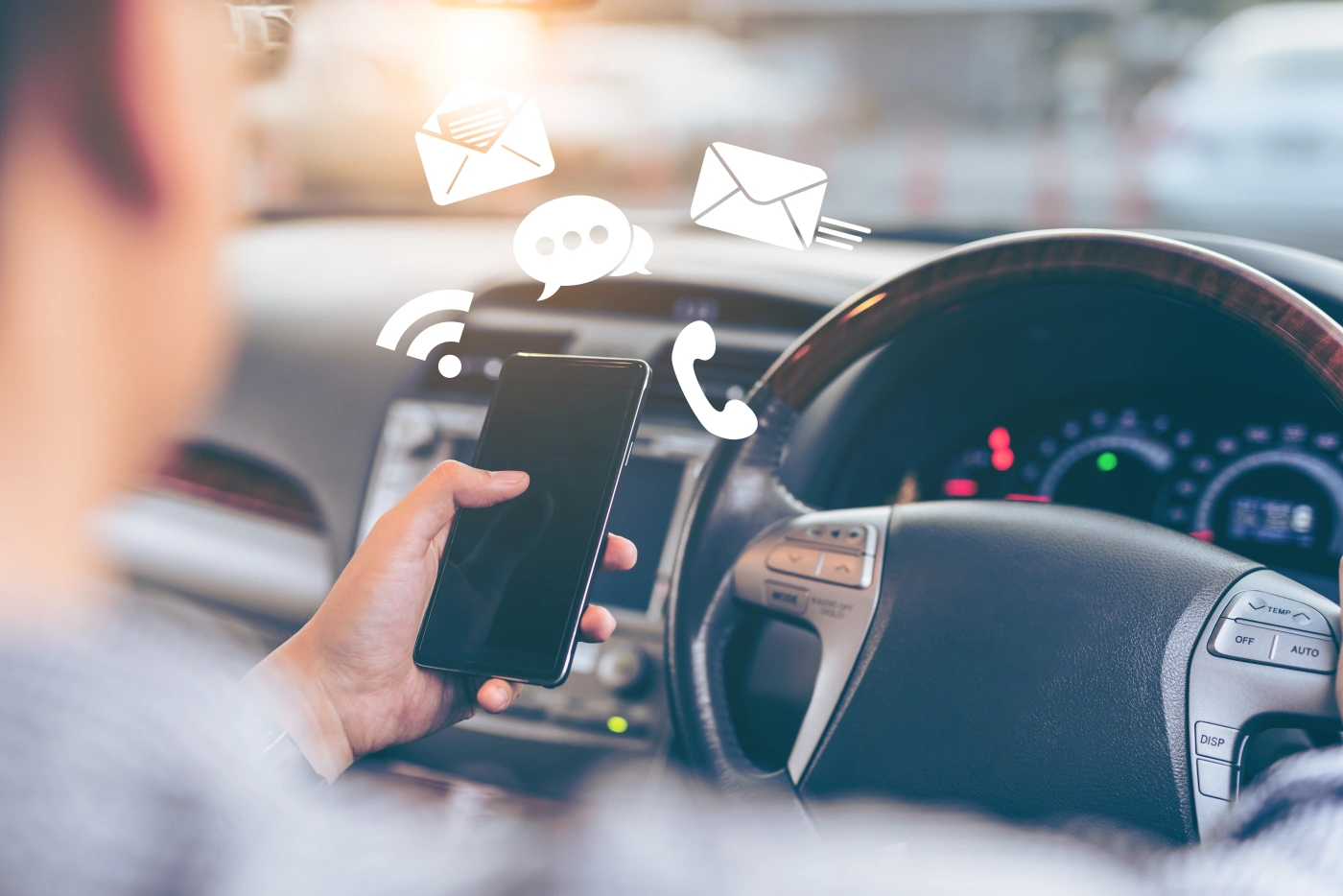You must realize that cellphone car accidents leading to fatalities result from the deadly distractions these devices cause while you drive, proving fatal even with a moment's inattention. Visual, cognitive, and manual distractions from texting, using navigation apps, or multitasking can lead to dire consequences. Prioritize safety and steer clear of distractions to guarantee a safe journey for everyone.
Distracted Driving Statistics
When examining distracted driving statistics, it becomes evident that the misuse of cellphones while operating a vehicle is a substantial contributing factor to car accidents. Texting, browsing social media, or talking on the phone diverts your attention from the road, increasing the risk of crashes. According to recent studies, approximately 1 out of 4 car accidents in the United States is caused by texting and driving. This alarming statistic highlights the perilous consequences of using cellphones while behind the wheel.
Moreover, distracted driving isn't just about texting. Even activities like changing the music, eating, or looking at GPS navigation can lead to accidents. It only takes a split second of distraction to cause a tragedy on the road. Remember, your safety and the safety of others should always come first when you're driving. By putting your phone away and focusing solely on the road, you can significantly lessen the chances of being involved in a car accident.
Cognitive Distraction Impact
A significant important cognitive distraction impact can be observed when drivers engage in activities that divert their mental focus away from the task of driving. This type of distraction occurs when your mind is not fully focused on the road ahead. When you use your cellphone to text, talk, or engage in other activities while driving, your cognitive abilities are divided between the task of driving and the phone-related activity. This division can slow down your reaction time, impair decision-making skills, and decrease situational awareness.
Engaging in complex or emotionally charged conversations can further exacerbate cognitive distraction, as your brain devotes more resources to processing the conversation rather than focusing on driving. Daydreaming, getting lost in thought, or being preoccupied with personal issues can also lead to cognitive distraction. It is important to recognize the dangers of cognitive distraction and prioritize the safety of yourself and others on the road by staying mentally present while driving. By avoiding activities that divert your attention, you can help reduce the risk of accidents and fatalities caused by cognitive distractions.
Visual Distraction Dangers
Visual distractions while driving, such as glancing at notifications on your cellphone, greatly enhance the risk of accidents and fatalities on the road. When you take your eyes off the road, even for just a few seconds, you are notably more likely to miss important visual cues like brake lights, pedestrian crossings, or sudden obstacles. This split-second distraction can have devastating consequences, leading to rear-end collisions, running red lights, or veering off the road.
The allure of quickly checking a text message or looking at a notification may seem harmless, but in reality, it poses a serious threat to your safety and the safety of others on the road. The visual distraction caused by your cellphone can impair your ability to react swiftly in critical situations, increasing the likelihood of a catastrophic accident. Remember, no text or notification is worth risking lives over. Stay focused on the road ahead and keep your eyes on the task of driving to make sure a safe journey for everyone.
Manual Distraction Risks
Engaging in manual distractions while driving, such as adjusting your radio or eating, can significantly increase the risk of accidents and jeopardize road safety. When you take your hands off the wheel to perform tasks like reaching for items, grooming, or adjusting controls, your focus shifts away from the road. These seemingly harmless actions can lead to perilous consequences.
Simple activities like changing the radio station may seem quick, but even a momentary distraction can have serious outcomes. A study by the National Highway Traffic Safety Administration found that engaging in manual distractions while driving makes you three times more likely to be involved in a crash. The act of reaching for objects or fiddling with controls diverts your attention from the primary task of driving, increasing the likelihood of collisions.
To safeguard your safety and the safety of others on the road, it's vital to minimize manual distractions. By staying focused on the task of driving and keeping your hands on the wheel, you can reduce the risk of accidents and help maintain road safety.
Texting While Driving Dangers
Texting while driving poses a significant risk to your safety and the safety of others on the road due to the dangerous distraction it creates. When you engage in texting behind the wheel, your attention is diverted from the road, increasing the likelihood of accidents. This dangerous habit not only endangers your life but also jeopardizes the lives of passengers, pedestrians, and other drivers sharing the road with you.
- Visual Distraction: Texting requires you to look at your phone, taking your eyes off the road.
- Manual Distraction: Typing messages on your phone means taking your hands off the wheel.
- Cognitive Distraction: Composing or reading texts diverts your mental focus away from driving tasks.
These factors combined make texting while driving a recipe for disaster. Remember, no message is worth risking your life or the lives of others. It's essential to prioritize safety and avoid texting while behind the wheel.
Phone Call Implications
When using your cellphone to make calls while driving, you introduce another form of distraction that can greatly impact your ability to focus on the road ahead. Engaging in phone calls diverts your attention away from the task of driving, leading to slower reaction times and decreased awareness of your surroundings. Research has shown that talking on the phone while driving can impair your cognitive functions, making it harder for you to process information quickly and make split-second decisions on the road.
Even if you are using a hands-free device, the act of conversing on the phone can still draw your attention away from driving. Your brain is actively involved in the conversation, reducing the amount of mental capacity available to concentrate on the road. This divided attention increases the likelihood of missing important visual and auditory cues while driving, putting you at a higher risk of being involved in a car accident. Remember, when you're behind the wheel, prioritize your safety and the safety of others by minimizing distractions like phone calls.
Social Media Impact
The prevalence of social media usage while driving poses a significant risk to road safety, diverting attention away from the task of operating a vehicle. Engaging with social media platforms while behind the wheel increases the likelihood of accidents due to distractions. Here are three ways in which social media impact contributes to the dangers on the road:
- Notifications: The constant stream of alerts from social media platforms can lead to frequent glances at your phone, taking your eyes off the road.
- Multitasking: Trying to post, like, or comment while driving requires cognitive engagement that should be focused on driving safely.
- Emotional Responses: Viewing emotionally charged content on social media can affect your mood and concentration, impacting your ability to react to traffic situations promptly.
To promote road safety, it is essential to prioritize your attention on driving and refrain from using social media while operating a vehicle.
Navigation App Risks
Utilizing navigation apps while driving can significantly heighten the risk of accidents due to distractions and divided attention. These apps offer valuable directions but demand visual and cognitive focus, diverting your eyes from the road and diverting your concentration from driving. Continuously monitoring the screen for upcoming turns or traffic updates shifts your focus away from the immediate surroundings, increasing the chances of overlooking important visual and auditory cues on the road. Additionally, entering new destinations or adjusting settings on the app while driving exacerbates the risk by introducing manual distractions into the equation.
Navigation app risks are worsened when drivers solely depend on these apps for navigation, creating a false sense of security and diminishing situational awareness. Consequently, drivers may become less attentive, potentially overlooking vital road signs, alterations in traffic conditions, or unforeseen hazards. Using navigation apps responsibly is crucial, setting the destination before commencing the journey, utilizing voice commands when feasible, and pulling over safely if adjustments are necessary. By being aware of the distractions these apps can induce, you can help minimize the risk of accidents and guarantee safer journeys.
Multitasking Consequences
Operating your cellphone while driving not only raises the risk of accidents but also leads to severe consequences when attempting to multitask behind the wheel. Multitasking while driving can have harmful effects on your safety and the safety of others on the road. Here are three consequences of multitasking while driving:
- Decreased Reaction Time: Dividing your attention between your phone and the road impairs your ability to react quickly to sudden changes in traffic or road conditions.
- Impaired Decision Making: Multitasking can lead to poor decision-making skills while driving, such as misjudging the distance between vehicles or failing to yield the right of way.
- Elevated Risk of Collisions: Engaging in activities like texting or browsing on your phone significantly increases the likelihood of being involved in a collision, putting yourself and others in danger.
Legal Implications
Engaging in distracted driving with your cellphone can result in serious legal consequences. Laws across various jurisdictions penalize drivers who use their cellphones while operating a vehicle. If you cause an accident due to cellphone use, you could face charges ranging from fines to criminal penalties, depending on the severity of the incident and the laws in your area. In some places, distracted driving violations can lead to hefty fines, points on your license, license suspension, or even jail time if there are injuries or fatalities involved. Additionally, if it can be proven that cellphone use directly contributed to the accident, you may also be held financially responsible for damages and medical expenses incurred by others. These legal implications extend beyond the immediate aftermath of the accident, potentially impacting your insurance premiums and future driving privileges. Hence, it is important to prioritize safety and avoid distractions while driving to prevent such serious legal consequences.
Frequently Asked Questions
Are There Any Specific Age Groups That Are More Prone to Cellphone-Related Car Accidents Leading to Fatalities?
You might wonder if certain age groups face a higher risk of fatal car accidents due to cellphone use. Data suggests that young drivers, especially those under 30, are more prone to such tragedies.
How Do Cellphone Car Accidents Leading to Fatalities Compare to Other Types of Distracted Driving Accidents in Terms of Severity?
When comparing cellphone car accidents leading to fatalities with other distracted driving incidents in regard to severity, the former often result in more tragic outcomes due to the high level of distraction and reduced reaction time.
Are There Any Particular Times or Locations Where Cellphone Car Accidents Leading to Fatalities Are More Likely to Occur?
You should be cautious when driving near intersections, highway exits, or during rush hour. These times and locations often see a higher likelihood of cellphone-related car accidents leading to fatalities. Stay alert and avoid distractions.
What Factors Contribute to the Increased Risk of Cellphone-Related Car Accidents Leading to Fatalities in Urban Areas Versus Rural Areas?
In urban areas, factors like higher traffic density, pedestrian activity, and complex road systems contribute to the increased risk of cellphone-related car accidents leading to fatalities. Stay alert and avoid distractions while driving.
Are There Any Technological Advancements or Interventions Being Developed to Help Reduce the Risk of Cellphone-Related Car Accidents Leading to Fatalities in the Future?
To reduce cellphone-related car accidents leading to fatalities, new technologies like hands-free systems and driver assistance features are being developed. These advancements aim to increase safety on the road by minimizing distractions and promoting focus.
Conclusion
So, next time you're tempted to check that text or scroll through social media while driving, remember the risks that come with distracted driving. Your actions behind the wheel can have serious consequences, not only for yourself but for others on the road. Stay focused, put down the phone, and prioritize safety above all else. It's not worth risking your life or the lives of others for a moment of distraction. Drive safely.



